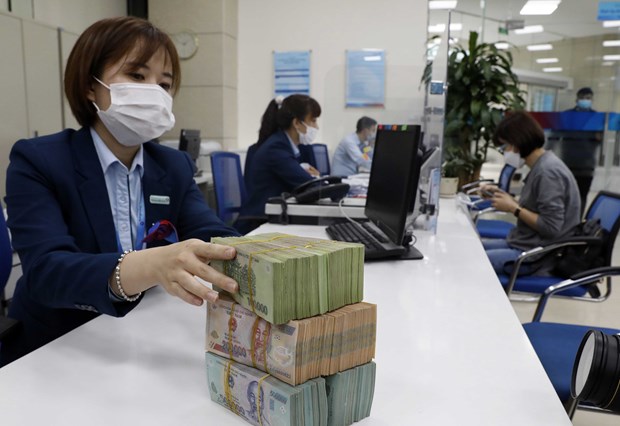Corporate bond maturities are projected to reappear in 2024
According to Yuanta Vietnam Securities, corporate bond maturities will resurface in 2024, totaling VND 297.006 trillion, with the real estate industry accounting for VND 126.637 trillion, or 42% of the total bond amount due.
Supporting Growth Direction
Vietnam's corporate bond market size relative to GDP reached 11% at the end of Q2 2023, higher than the Philippines (7%) and Indonesia (2%). However, it is still much lower than Thailand (27%), Singapore (27%), and Malaysia (54%), and lower than the corporate bond market's highest development stage in 2021, which was 15%.

Due to early redemptions and slower issuances, outstanding corporate bond debt reached 9.6% of total credit outstanding in the economy by the end of September 2023, a considerable decrease from the end of 2022 (11.9%) and 2021 (15.1%).
Following a poor first two quarters, the corporate bond market showed indications of revival in the third quarter of 2023. Vietnam's objective is still to expand the corporate bond market as a long-term and medium-term capital channel for the economy, with banks providing short-term finance for enterprises involved in short-term production and business operations.
This is also why the size of the corporate bond market rose dramatically between 2018 and 2021. However, due to early difficulties, a slowdown was required to assure stability, resulting in a scale contraction during the previous two years.
Looking at the government's approach, analysts predict that Vietnam's bond market will continue to develop. Its present contribution of GDP of almost 11% in Q2 2023 is likely to rise further in the next years.
Vibrancy from Q3 Onward
The corporate bond market became increasingly active beginning in Q3 2023, coinciding with the launch of the Hanoi Stock Exchange's individual bond trading system. In the first ten months of 2023, the total value of issuances reached VND 214 trillion, a 15% decline from the same period previous year. VND 192 trillion came from private issuances, whereas VND 22 trillion came from public offers.
The trend of public offerings has witnessed tremendous increase, with issuance values nearly tripling over the previous year, while private issuances have declined by 22.8% over the same period last year owing to new bond market restrictions.
In the first ten months of 2023, the corporate bond issuance structure was dominated by the banking and real estate industries. Banks have been under pressure in recent years to provide short-term loans for medium- to long-term projects, resulting in a significant demand for more capital. As a result, the trend of bank bond issuance is projected to continue in the coming year.
Furthermore, given the expanding scope of the financial industry, particularly the stock market, as seen by the increasing number of new accounts, financial service businesses, including securities firms, have a need for higher capital.
High Interest Rates on New Issues
In terms of interest rate trends, interest rates in the banking industry began to fall dramatically in Q2 and Q3 2023 and continued to fall swiftly in Q4. However, corporate bond issuance interest rates did not fall commensurate since the bond market's attractiveness has not fully recovered. This is a crucial component in maintaining high bond issuance rates.
The real estate industry has the highest bond issuance interest rates across other sectors, while the tourism and entertainment industries also have higher issuance rates than two years ago. Only the banking sector has witnessed a fall in average interest rates compared to the previous year, since they continue to rely on the public for short-term funding.
In most locations, there has been a rising trend in bond issuance terms during the last ten months. However, the issuance value has been mostly focused on short-term durations. The 1-3 year term accounted for 36% of the entire issuance value, compared to 21% in 2021 and 30% in 2022; the 3-5 year term declined dramatically to 19%, from 44% and 35% in 2021-2022, respectively.
High issuance rates and an insufficient recovery of the corporate bond market, according to experts, are reasons prompting a preference for short-term durations.
It is obvious that issuance is one part, but given the volatility in the bond market, the tale of bond repurchases has also been significant from 2022 until the present. Enterprises with considerable cash reserves, on the other hand, have a demand for bond repurchases, especially from the banking industry.
The reason for this is that loan growth was just approximately 7% in the first nine months of 2023, compared to 11% in the same time last year. Thus, capital investment distribution mirrored market developments in the prior era. Still, distribution is not as projected at this point, resulting in banks having surplus cash, causing them to take steps to repurchase bonds before maturity.
Businesses repurchased bonds before maturity worth VND 48.261 trillion in Q3 2023, a 22% reduction from the same time last year. The majority of these bonds were from the banking sector, accounting for 56% of the total buyback value; the construction and real estate industries came in second and third, with VND 5.532 trillion (11.5%) and VND 3.481 trillion (7.2%), respectively.

Some opinions suggest that banks repurchase bonds and then issue new bonds with longer terms. However, this picture is still not entirely clear.
Maturity Pressure Returns Next Year
The maturity pressure in Q4 2023 is not unduly large, with VND 57.286 trillion, 46.7% of which is accounted for by the real estate sector. However, maturity pressure on bonds in 2024 is looming, with a total value of VND 297.006 trillion, with the real estate sector accounting for VND 126.637 trillion, or 42% of the total bond value due.
As a result, the maturity pressure on the real estate industry is the most severe, and it is critical to continue monitoring the financial status of enterprises in this sector to decide whether they will be able to repay loans in the next trend or if debt restructuring will be necessary. Many corporations have recently begun discussions with bondholders to extend their debt until about 2025-2026.
The pressure in Q4 will be manageable, but the tale will grow more difficult starting next year. Certainly, some steps will be taken to address this issue, since real estate remains a key part of the economy.
Since the functioning of the individual bond trading platform, the secondary market has been increasingly active. The total amount of individual bond trades on the secondary market reached VND 29 billion in October 2023.








